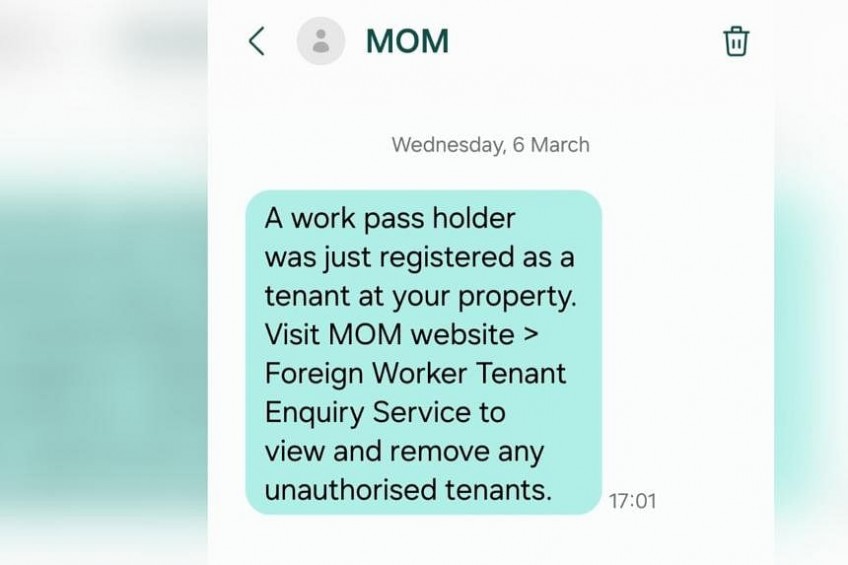'I have been having sleepless nights': Woman finds 2 migrant workers registered to her home address


SINGAPORE – Madam Lim was shocked when, in early March, she received an SMS from the Ministry of Manpower (MOM) informing her that a migrant worker was registered as a tenant at her condominium unit.
The 59-year-old, who declined to give her full name, received another shock when she went online and found that another migrant worker had earlier been registered as a tenant at the same unit.
She had already rented out the Jurong East home to a Japanese couple, and said that she, the rightful tenants and her agent all had no knowledge of the two migrant workers registered at the unit. Madam Lim has since made a police report, and the police confirmed that a report has been lodged.
“I have been having sleepless nights because of this. If (the workers) got into any trouble, or borrowed money from loan sharks, people would be showing up at my doorstep,” said Madam Lim, a secretary.
“Worse still, my tenants didn’t know anything. If they were suddenly greeted by the police or loan sharks at the door, I am sure they would be terrified.”
In the SMS from MOM were instructions to check the Foreign Worker Tenant Enquiry Service (FWTES) on the ministry’s website, which Madam Lim did. There, she found that a worker had been registered at her Jurong East condo on Feb 29, and another on March 6, by two different companies – one a transport firm, and the other a beauty salon.
She said she immediately blocked the address from being used to register other migrant workers – a measure that home owners can pre-emptively use in the system – and removed the two workers from its list of tenants before informing the police.
Both companies declined to comment when contacted by The Straits Times.
In response to queries, MOM said employers are responsible for reporting their migrant workers’ accurate residential addresses. This is even when their workers look for their own accommodation, as these workers must give accurate information to their employers.
Migrant workers found to have given false information about their address to their employers have had their work permits revoked, and been banned from working in Singapore, said MOM.
The ministry added that employers who submit such information without checking will be fined, and may be barred from hiring work pass holders.
Introduced in December 2018, the FWTES replaced the previous system of home owners having to submit hardcopy declaration forms to remove the names of work pass holders previously living at their residences.
It aims to “help detect misuse of home addresses”, according to a written parliamentary reply by then Manpower Minister Josephine Teo on Oct 5, 2020.
MOM’s website states that this online service contains the information of only non-domestic work pass holders, meaning domestic helpers are excluded from the system.
Through the FWTES, home owners can check the details of work pass holders registered at their address, and report any discrepancies to the ministry.
However, SMS notifications to inform home owners when a work pass holder was registered at their address were introduced only in February 2024.
“As a result of our measures, the number of false declared addresses has dropped to around 300 per year, from an average of 1,000 previously,” MOM said when asked by ST for the number of reports of falsely declared addresses since December 2018.
The ministry did not provide a response when asked if there were more reports filed by owners of private or public housing units.
In a May 2019 Business Times report, 489 home owners reported that their addresses had been misused, when they checked on the FWTES after its soft launch in December 2018. Before the online service started, there were fewer than 30 reports each year.
But more pre-emptive measures may be needed, said a spokesperson for migrant worker advocate group Humanitarian Organisation for Migration Economics.
Citing a rise in the number of migrant workers in the construction, marine shipyard and process sectors – 441,100 as at December 2023, according to MOM’s website, a five-year high – the spokesperson said the increase resulted in a housing crunch for these workers, exacerbated by rising rental prices.
“Employers may not be able to build their own accommodation in time for the workers’ arrival.
“Due to these circumstances, employers might be falsely declaring migrant workers as tenants at different addresses as they are unable to secure housing in dormitories, (or) private apartments, or public housing,” said the spokesperson.
“To ensure that workers have quality living spaces, we recommend frequent inspections at the listed addresses, with regular feedback given by workers on their living conditions.”
This article was first published in The Straits Times. Permission required for reproduction.